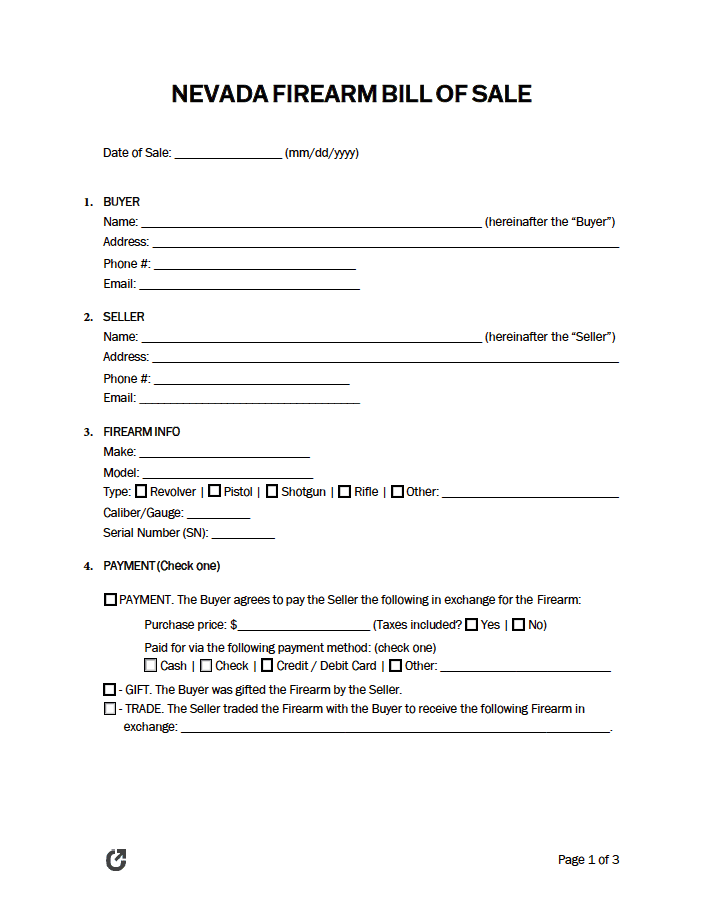Nevada Firearm Bill of Sale Form
A Nevada firearm bill of sale form allows buyers and sellers to record the crucial details of a weapon purchase. In addition to providing the contact information of both parties, the document also lists the gun’s make, model, type, caliber, and serial number. It further discloses the sale date and the firearm’s value and announces whether the transaction happened by payment, gift, or trade. The form does not require notarization, although this step is highly recommended for authenticity.
|
What is a Nevada Gun Bill of Sale?
A Nevada gun bill of sale holds space for information about a gun transaction. Purchasers and owners complete the form together, then sign to denote their approval. By entering their names into the contract, both parties agree to the enclosed data, the disclosure statements, and additional terms. Incomplete documents do not have functionality, meaning neither person can use them to verify the transaction. Therefore, the buyer and seller must ensure they have completed all required fields to the best of their ability.
How to Apply for a Firearm Permit (CCW)
Residents eighteen (18) years or older can carry guns openly in approved locations. However, Nevada requires firearm permits (CCW) for concealed carry. Individuals twenty-one (21) years or older can obtain licenses by taking the steps needed.
County sheriff’s offices and police stations handle permitting, with each location having particular requirements. It is the applicant’s responsibility to obtain information from their local jurisdiction. Once approved, permit holders must have their CCW and state identification (ID) card when concealed carrying. If they do not have it on their body, they can receive fines of up to $25.
Applicants must be in good standing with the law, meaning they cannot apply if the state prohibits them from owning firearms. Law enforcement can arrest people who carry handguns without CCWs. The state considers this act a “Class C Felony,” which can result in one (1) to five (5) years of prison time and fines up to $10,000.
Step 1 – Exemptions
The state has specific requirements on who can apply for and receive a CCW to protect its citizens and communities. Fugitives, felons, previous inmates on parole or probation, and illegal immigrants do not qualify. Furthermore, residents may not obtain a CCW if they have criminal convictions, including 1) misdemeanors and/or threat of force within three (3) years, 2) domestic violence, 3) stalking, 4) driving under the influence (DUI) within five (5) years.
Nevada also prohibits individuals with a restraining order (or protection against violence) or dishonorably discharged military members. People also do not qualify if they have a medical marijuana card, resided in a mental health facility within five (5) years, or were deemed mentally incompetent by a professional.
Step 2 – Firearm Safety Course
Individuals must take an eight (8) hour course and live fire to apply for their initial CCW. The resident must select a state-approved instructor and pass the class. Next, the teacher must complete the certification form, which the student must attach to their CCW application.
County sheriff’s offices and local police stations can provide interested parties with more information on certified instructors and courses.
Step 3 – Application
Applicants must have the necessary paperwork and payment ready upon arrival. Each office can have specific requirements; therefore, the resident should contact their local sheriff or police station to ensure they have the correct documents and fees. Since fingerprinting takes place during the appointment, they should trim their fingernails. Otherwise, this issue impacts the quality and usability of the fingerprint, potentially delaying the application process.
Bring the Following:
|
Step 4 – Processing
Per Nevada law, the state has 120 days to process the application and provide an approval or denial statement. Rejected applicants can contest by following the instructions in the notice.
If approved, the applicant must understand and follow state concealed carry laws. For example, the CCW holder cannot carry in: public or private schools, colleges or universities, childcare facilities, VA or federal facilities, airports, government or legislative buildings, post offices, military bases, or the Hoover Dam.
Individuals who fail to abide by these carrying laws can face up to six (6) months of jail time, up to $1,000 fines, and may or may not have to do community service.
Step 5 – Renew
Nevada CCW holders must renew their permit every five (5) years. Individuals have up to 120 days to renew before expiration. If they fail to reapply before this date, they must apply as a new applicant.
The state requires individuals to take a refresher firearm safety course during each renewal period. They must undergo four (4) hours of instruction and live fire shooting. In addition, the person must provide new photos and fingerprints during renewal.
